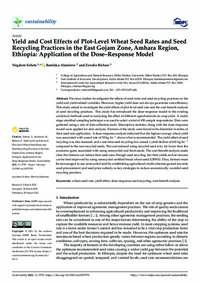Yield and Cost Effects of Plot-Level Wheat Seed Rates and Seed Recycling Practices in the East Gojam Zone, Amhara Region, Ethiopia: Application of the Dose–Response Model

Authors:
Previous studies investigated the effects of seed rates and seed recycling practices on the yield and yield-related variables. However, higher yield does not always guarantee cost-efficiency. This study aimed to investigate the yield effects of plot-level seed rate and the cost-benefit analysis of seed recycling practices. This study has introduced the dose-response model to the existing analytical methods used in analyzing the effect of different agrochemicals on crop yield. A multi-stage stratified sampling technique was used to select a total of 450 sample respondents. Data were gathered using a mix of data collection tools. Descriptive statistics along with the dose-response model were applied for data analysis. Farmers of the study were found to be dissimilar in terms of their seed rate application. A dose-response analysis indicated that the highest average wheat yield was associated with a seed rate of 50 kg ha(-1) above what is recommended. The yield effect of seed recycling was also assessed, and a one-time seed recycling has caused a yield decline of 665 kg ha(-1) compared to the non-recycled seeds. The cost reduced using recycled seed is by far lower than the economic gains associated with using unrecycled and fresh seeds. The cost-benefit analysis made clear that farmers can reduce their seed costs through seed recycling, but their yields and net income can be best improved by using unrecycled certified bread wheat seed (CBWS). Thus, farmers must be encouraged to use unrecycled seed by establishing agricultural credit schemes geared towards seed procurement and seed price subsidy as key strategies to reduce economically wasteful seed recycling practices.
